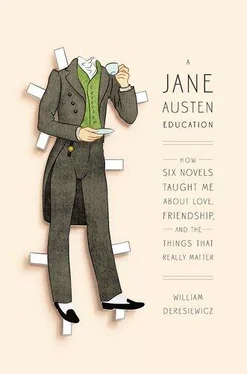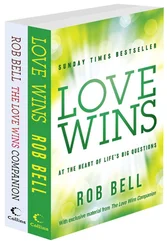Eventually, Emma’s bored disdain for the people around her led her to her very worst moment. Frank Churchill, her governess’s stepson, had come to Highbury for a visit. Frank was lively, good-looking, a little bit of a bad boy, and he played up to Emma so extravagantly that her head grew bigger than ever. It was summer, and they all decided to go on a picnic: Emma, Frank, Harriet, Jane Fairfax, Miss Bates, Mr. Elton—everyone who mattered. When they actually got there, though, Emma and Frank’s flirtation was so oppressive to everybody else that they all soon found themselves sitting around with nothing to say. So Frank devised a happy plan to have them entertain the grand young lady. “Here are seven of you,” he announced, “and she only demands from each of you either one thing very clever, . . . or two things moderately clever, . . . or three things very dull indeed.” Poor, harmless Miss Bates, who knew perfectly well how tedious everybody found her, was left feeling very self-conscious. “Oh! very well,” she exclaimed, “then I need not be uneasy. ‘Three things very dull indeed.’ That will just do for me, you know. I shall be sure to say three dull things as soon as ever I open my mouth, shan’t I?”
And that was when Emma, carried away by Frank’s flattery and her own sense of effortless superiority, hit bottom. “Ah! ma’am, but there may be a difficulty. Pardon me—but you will be limited as to number—only three at once.” It was a shocking piece of cruelty, all the worse for the way that its victim received it:
Miss Bates, deceived by the mock ceremony of her manner, did not immediately catch her meaning; but, when it burst on her, it could not anger, though a slight blush shewed that it could pain her.
“Ah!—well—to be sure. Yes, I see what she means, . . . and I will try to hold my tongue. I must make myself very disagreeable, or she would not have said such a thing to an old friend.”
And that was when I finally understood what Austen had been up to all along. Emma’s cruelty, which I was so quick to criticize, was nothing, I saw, but the mirror image of my own. The boredom and contempt that the book aroused were not signs of Austen’s ineptitude; they were the exact responses she wanted me to have. She had incited them, in order to expose them. By creating a heroine who felt exactly as I did, and who behaved precisely as I would have in her situation, she was showing me my own ugly face. I couldn’t deplore Emma’s disdain for Miss Bates, or her boredom with the whole commonplace Highbury world, without simultaneously condemning my own.
Austen, I realized, had not been writing about everyday things because she couldn’t think of anything else to talk about. She had been writing about them because she wanted to show how important they really are. All that trivia hadn’t been marking time until she got to the point. It was the point. Austen wasn’t silly and superficial; she was much, much smarter—and much wiser—than I could ever have imagined.
I returned to the novel in a completely different frame of mind. Mr. Woodhouse’s banalities, Miss Bates’s monologues, all that gossip and small talk—Austen put them in as a sign that she respected her characters, not because she wanted us to look down on them. She was willing to listen to what they had to say, and she wanted me to listen, too. As long as I had treated such passages as filler and hurried through them, they had seemed impossibly dull. But once I started to slow down long enough to take them on their own terms, I found that they possessed their own gravity, their own dignity, their own sweetness.
Jane Fairfax’s letters and where they may have been hiding, little John and Henry’s cleverness and pretty ways—these things mattered, because they mattered to the characters themselves. They made up the texture of their lives, and gave their existence its savor. I got it now. By eliminating all the big, noisy events that usually absorb our interest when we read novels—the adventures and affairs, the romances and the crises, even, at times, the plot—Austen was asking us to pay attention to the things we usually miss or don’t accord enough esteem, in novels or in life. Those small, “trivial,” everyday things, the things that happen hour by hour to the people in our lives: what your nephew said, what your friend heard, what your neighbor did. That, she was telling us, is what the fabric of our years really consists of. That is what life is really about.
Even Emma knew this. She just didn’t know she knew it. “There was not a creature in the world,” Austen wrote about her governess, Mrs. Weston, to whom the heroine spoke “with such unreserve”:
not any one, to whom she related with such conviction of being listened to and understood, of being always interesting and always intelligible, the little affairs, arrangements, perplexities, and pleasures of her father and herself. She could tell nothing of Hartfield, in which Mrs. Weston had not a lively concern; and half an hour’s uninterrupted communication of all those little matters on which the daily happiness of private life depends, was one of the first gratifications of each.
Emma was always looking in the wrong direction. Her heart was in the right place—that was what ultimately made me forgive her, and, finally, what saved her—but her busy brain led her astray. While she plotted her schemes and dreamed her dreams, her “daily happiness” was right there in front of her, in “affairs, arrangements, perplexities, and pleasures”—the hourly ordinary, in all its granular specificity.
The novel had a name for this gossipy texture of daily life, a word I stumbled upon again and again. “Many little particulars”; “I am impatient for a thousand particulars”; “She will give you all the minute particulars.” Not just particulars, but “little” particulars, “minute” particulars. Life is lived at the level of the little. In fact, I now saw, it was remarkable just how many things in the novel were “little.” “Little particulars.” “Little affairs, arrangements, perplexities, and pleasures.” Harriet Smith was “little,” always. Her friends the Martins had “a little Welch cow, a very pretty little Welch cow,” and a little gazebo in the garden, just big enough to hold a dozen people. The story took place entirely within the vicinity of Highbury, and space itself seemed contracted by the smallness of the frame. The distance between Emma’s house and Mrs. Weston’s was only half a mile, yet it was made to seem like an arduous journey. Though Emma was over four hundred pages long, its whole scale was little, like a crowded scene inscribed upon a miniature.
If I was having trouble seeing the importance of the world that Austen was putting in front of me, in other words, it wasn’t entirely my fault. Like all the great teachers, I now saw, she made us come to her. She had momentous truths to tell, but she concealed them in humble packages. Her “littleness” was really an optical illusion, a test. Jesus spoke in parables so his disciples would have to make an effort to understand him. The truth, he knew, cannot be grasped in any other way. Austen reminded me, I realized, of something that Plato said about his great mentor Socrates, who also taught by telling stories. “His words are ridiculous when you first hear them, for his talk is of pack-asses and smiths and cobblers . . . so that any ignorant or inexperienced person might feel disposed to laugh at him; but he who sees what is within will find that they are the only words which have a meaning in them, and likewise the most divine.”
Austen’s words, quite apart from what she said with them, also struck me as ridiculous when I first heard them. I was used to stylistic brilliance that hit you over the head: Joyce’s syntactic labyrinths, Nabokov’s arcane vocabulary, Hemingway’s bleached-bone austerities. So what was I supposed to make of passages like this, near the start of the novel?
Читать дальше












